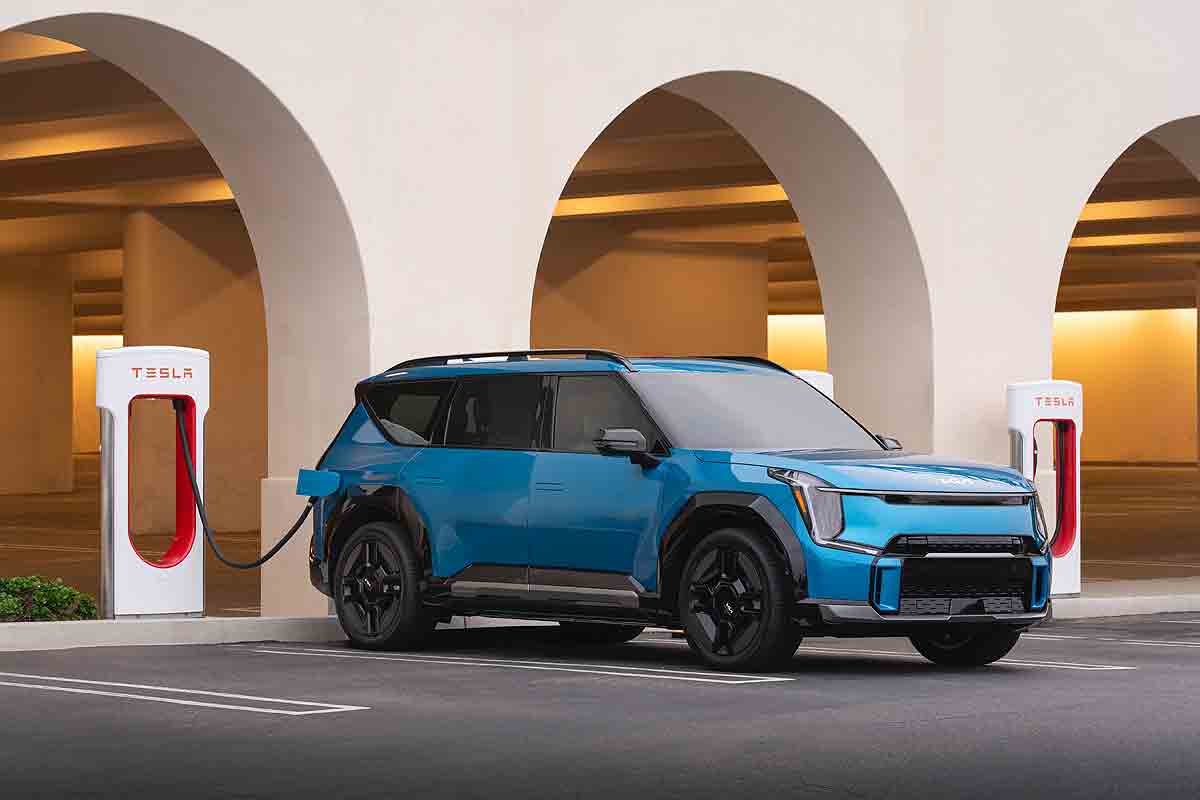Hyundai and Kia to Adopt Tesla EV-Charging Standard in the United States
Hyundai Motor and Kia Corp recently announced their decision to adopt Tesla Inc’s electric vehicle (EV) charging technology in the United States. This move comes as the South Korean automakers join their global peers, including Ford Motor, General Motors, and Nissan, in embracing Tesla’s North American Charging Standard (NACS) as the industry standard for EV charging.
The Adoption of Tesla’s Charging Technology
Hyundai and Kia will equip their new EVs with a NACS port, starting in the fourth quarter of 2024 in the United States. This strategic decision will provide Hyundai and Kia EV owners with access to over 12,000 Tesla Superchargers across the United States, Canada, and Mexico.
Furthermore, the automakers plan to offer adapters to existing and future Hyundai and Kia EV owners with the current Combined Charging System (CCS). This will enable them to connect to Tesla’s Supercharging Network by the first quarter of 2025.
The Significance of Tesla’s NACS
Tesla’s NACS has gained significant popularity and accessibility, with the U.S. Department of Energy reporting that NACS chargers represent approximately 60% of the fast chargers in the United States. This widespread adoption has positioned Tesla’s charging technology as a leading contender in the EV market.
In contrast, the rival CCS system, backed by automakers such as Volkswagen, faces the challenge of competing with Tesla’s NACS. However, there have been discussions between Tesla and Volkswagen regarding the potential adoption of NACS.
Expansion of Hyundai and Kia’s EV Charging Network
In July, Hyundai announced its collaboration with companies like Kia, Stellantis, and BMW to establish a joint venture aimed at developing an EV charging network in the United States. This initiative seeks to challenge Tesla’s dominance in the EV market and take advantage of subsidies provided by the Biden administration.
The joint venture aims to create a robust network of charging stations, ensuring convenient access for Hyundai and Kia EV owners across the country. By leveraging partnerships and government support, Hyundai and Kia are positioning themselves as significant players in the EV charging infrastructure space.
Timeline for Implementation
Hyundai and Kia have outlined their timeline for the adoption of Tesla’s EV-charging standard. In the United States, Hyundai EVs equipped with the NACS port will be available in the fourth quarter of 2024. Meanwhile, Kia’s EVs will feature this technology by the end of 2024.
In Canada, Hyundai EVs with the NACS port will be available in the first half of 2025, while Kia’s EVs will follow suit by the end of 2024. This phased implementation demonstrates the automakers’ commitment to providing their customers with enhanced charging capabilities in both the United States and Canada.
Advantages of Tesla’s Supercharger Network
The adoption of Tesla’s NACS by Hyundai and Kia brings several advantages to their EV customers. By utilizing Tesla’s Supercharger Network, Hyundai and Kia EV owners gain access to a vast network of charging stations strategically located across North America.
Tesla’s Superchargers are known for their high charging speeds, allowing EV owners to recharge their vehicles quickly and efficiently. This accessibility and convenience contribute to a seamless and enjoyable EV ownership experience.
Implications for the EV Charging Industry
Hyundai and Kia’s decision to adopt Tesla’s EV-charging standard has significant implications for the EV charging industry as a whole. With prominent automakers aligning with Tesla’s NACS, the industry is witnessing a shift towards a standardized charging infrastructure.
This move also impacts the competition between the NACS and the CCS systems. As more automakers adopt Tesla’s NACS, the CCS system faces the challenge of maintaining its relevance and market share. However, discussions between Tesla and other automakers regarding the adoption of NACS indicate the potential for collaboration and the possibility of a unified charging standard in the future.
Conclusion
Hyundai and Kia’s adoption of Tesla’s EV-charging standard marks a significant milestone in the EV industry. By embracing Tesla’s NACS, the South Korean automakers are enhancing the charging capabilities of their EVs and providing their customers with access to Tesla’s extensive Supercharger Network.
This strategic decision not only benefits Hyundai and Kia EV owners but also contributes to the establishment of a standardized charging infrastructure in the United States and beyond. As the industry continues to evolve, collaborations and partnerships between automakers are crucial for the widespread adoption of electric vehicles and the growth of the EV charging network.
